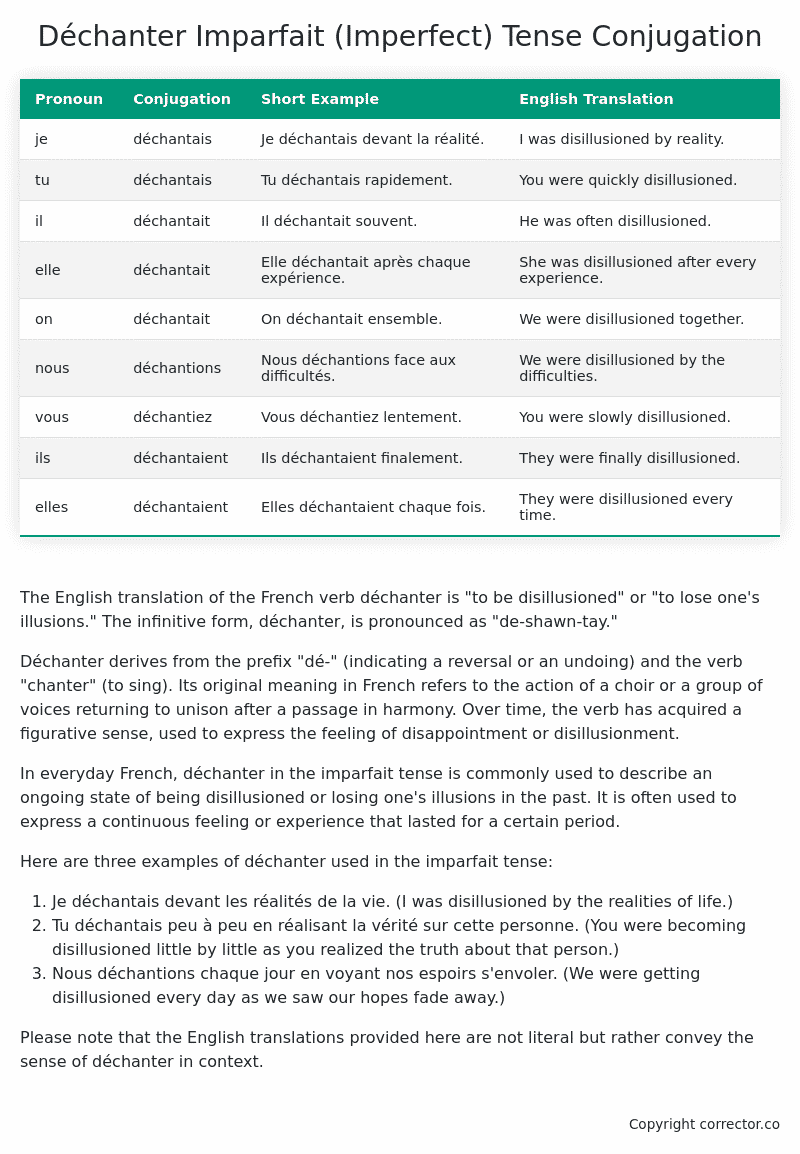Imparfait (Imperfect) Tense Conjugation of the French Verb déchanter
Introduction to the verb déchanter
The English translation of the French verb déchanter is “to be disillusioned” or “to lose one’s illusions.” The infinitive form, déchanter, is pronounced as “de-shawn-tay.”
Déchanter derives from the prefix “dé-” (indicating a reversal or an undoing) and the verb “chanter” (to sing). Its original meaning in French refers to the action of a choir or a group of voices returning to unison after a passage in harmony. Over time, the verb has acquired a figurative sense, used to express the feeling of disappointment or disillusionment.
In everyday French, déchanter in the imparfait tense is commonly used to describe an ongoing state of being disillusioned or losing one’s illusions in the past. It is often used to express a continuous feeling or experience that lasted for a certain period.
Here are three examples of déchanter used in the imparfait tense:
- Je déchantais devant les réalités de la vie.
(I was disillusioned by the realities of life.) - Tu déchantais peu à peu en réalisant la vérité sur cette personne.
(You were becoming disillusioned little by little as you realized the truth about that person.) - Nous déchantions chaque jour en voyant nos espoirs s’envoler.
(We were getting disillusioned every day as we saw our hopes fade away.)
Please note that the English translations provided here are not literal but rather convey the sense of déchanter in context.
Table of the Imparfait (Imperfect) Tense Conjugation of déchanter
| Pronoun | Conjugation | Short Example | English Translation |
|---|---|---|---|
| je | déchantais | Je déchantais devant la réalité. | I was disillusioned by reality. |
| tu | déchantais | Tu déchantais rapidement. | You were quickly disillusioned. |
| il | déchantait | Il déchantait souvent. | He was often disillusioned. |
| elle | déchantait | Elle déchantait après chaque expérience. | She was disillusioned after every experience. |
| on | déchantait | On déchantait ensemble. | We were disillusioned together. |
| nous | déchantions | Nous déchantions face aux difficultés. | We were disillusioned by the difficulties. |
| vous | déchantiez | Vous déchantiez lentement. | You were slowly disillusioned. |
| ils | déchantaient | Ils déchantaient finalement. | They were finally disillusioned. |
| elles | déchantaient | Elles déchantaient chaque fois. | They were disillusioned every time. |
Other Conjugations for Déchanter.
Le Present (Present Tense) Conjugation of the French Verb déchanter
Imparfait (Imperfect) Tense Conjugation of the French Verb déchanter (You’re reading it right now!)
Passé Simple (Simple Past) Tense Conjugation of the French Verb déchanter
Passé Composé (Present Perfect) Tense Conjugation of the French Verb déchanter
Futur Simple (Simple Future) Tense Conjugation of the French Verb déchanter
Futur Proche (Near Future) Tense Conjugation of the French Verb déchanter
Plus-que-parfait (Pluperfect) Tense Conjugation of the French Verb déchanter
Passé Antérieur (Past Anterior) Tense Conjugation of the French Verb déchanter
Futur Antérieur (Future Anterior) Tense Conjugation of the French Verb déchanter
Subjonctif Présent (Subjunctive Present) Tense Conjugation of the French Verb déchanter
Subjonctif Passé (Subjunctive Past) Tense Conjugation of the French Verb déchanter
Subjonctif Imparfait (Subjunctive Imperfect) Tense Conjugation of the French Verb déchanter
Subjonctif Plus-que-parfait (Subjunctive Pluperfect) Tense Conjugation of the French Verb déchanter
Conditionnel Présent (Conditional Present) Tense Conjugation of the French Verb déchanter
Conditionnel Passé (Conditional Past) Tense Conjugation of the French Verb déchanter
Conditionnel Passé II (Conditional Past II) Tense Conjugation of the French Verb déchanter
L’impératif Présent (Imperative Present) Tense Conjugation of the French Verb déchanter
L’impératif Passé (Imperative Past) Tense Conjugation of the French Verb déchanter
L’infinitif Présent (Infinitive Present) Tense Conjugation of the French Verb déchanter
L’infinitif Passé (Infinitive Past) Tense Conjugation of the French Verb déchanter
Le Participe Présent (Present Participle) Tense Conjugation of the French Verb déchanter
Le Participe Passé (Past Participle) Tense Conjugation of the French Verb déchanter
Struggling with French verbs or the language in general? Why not use our free French Grammar Checker – no registration required!
Get a FREE Download Study Sheet of this Conjugation 🔥
Simply right click the image below, click “save image” and get your free reference for the déchanter imparfait tense conjugation!

Déchanter – About the French Imparfait Tense
NOTE: To take a deep dive into all the French tenses then see our article on Mastering French Tense Conjugation.
Formation of the Imparfait Tense
For regular -er verbs:
For regular -ir verbs
For regular -re verbs
Common Everyday Usage Patterns
Description of Past Habits
Background Information
Mental and Emotional States
It’s employed to express emotions, thoughts, or physical sensations in the past. For example: “J’étais content quand il est arrivé.” (I was happy when he arrived.)
Ongoing Actions
Points to Note About the Imparfait Tense
Passé Composé vs. Imparfait
Conditional
Si Clauses
Narration
I hope you enjoyed this article on the verb déchanter. Still in a learning mood? Check out another TOTALLY random French verb imparfait conjugation!


